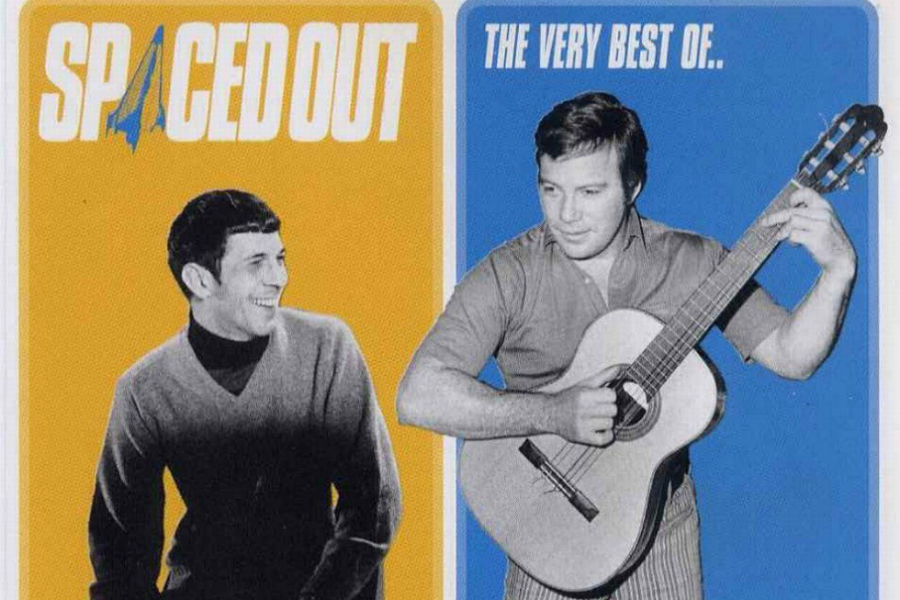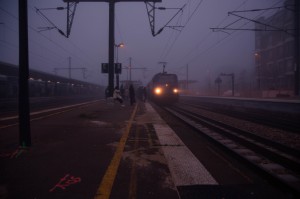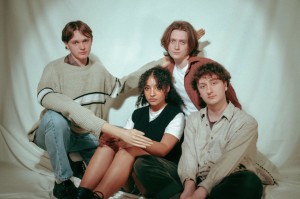Playlist: Sounds of Science Fiction

Ahead of FACT’s new science fiction inspired exhibition, C James Fagan listens to the skies…
Science fiction and music have had quite a flirty relationship over the years. Musicians draw inspiration from the motifs and tropes of classic sci-fi books, films and comics; both sci-fi and music attract people with a similar mindset; people who are obsessive, creative, and with a desire to inhabit new worlds.
Forms of speculative fiction provide a framework to explore new identities; use the astronaut as a metaphor for alienation; or simply provide a novelty cash-in for whatever space craze is happening. There’s so much science fiction themed music out there selecting ten songs has been tough.
In doing so I’ve tried to avoid obvious stone-cold classics, such as Bowie’s Space Oddity. But where should this journey into shifting tomorrow’s begin? Why not in the Space Age, in the ’50s when actual trips into space collided with images of Saucer Men. An interest in all things spacey saw The Tornados reach number one with Telestar; produced by Joe Meek, who was not only able to create a top-tapping smash hit, but also produce music which invokes an alien landscape, such as I Hear a New World.
Meanwhile, in the home of rockets, seminal American sci-fi author Philip K Dick was having his first novel printed. Dick was a famous lover of opera, referencing this throughout his writing (in Do Androids Dream of Electric Sheep (1968), an android disguises itself as an opera singer). For this playlist I have selected the Prisoners Chorus from Bethoven’s Fedilio, which features in the 1977 novel A Scanner Darkly.
This isn’t the only musical crossover in Dick’s work; in VALIS (1981) the character Mini Rogers is based on Brian Eno, and famously Gary Numan used Do Androids Dream of Electric Sheep as the basis for his hit Are Friends Electric.
But that’s the future.
Before Numan, the Space Race was hurtling towards its celestial goal, and TV sci-fi was spawning some poptastic sounds. Our very own Doctor Who has scored a hit with its theme tune, while its trans-Atlantic cousin Star Trek also made waves in the beat-scene. While the results of various Star Trek cast members recordings where varied, here’s Leonard Nimoy’s (in character) spoken word piece, Spock Thoughts.
As the ’60s slipped in the ’70s, it seemed we turned away from the stars, possibly because it appeared that extra-terrestrial visitors had already arrived. David Bowie appeared as an alien attempting to ingratiate himself within his new earthly home. He wasn’t alone; intergalactic funksters Parliament partied-on-down waiting for the Mothership to turn up. Their predecessor Sun Ra, the vanguard of sonic invasion, became a herald of of interstellar transcendence for those who find Earth boring.
Despite the efforts of these glamorous starpeople, more dystopian sounds dominated the end of the ’70s and ’80s, more inspired by William Burroughs, Philip K Dick and J. G. Ballard. Employing the most futuristic instrument, the synthesiser, musicians like Numan, The Human League and Cabaret Voltaire created an electronic soundscapes, spawned from the concrete grey of the UK that foreshadowed the Cyberpunk genre.
Out of this bleak vision came The Normal’s Warm Leatherette, a song drawn from Ballard’s infamous 1975 novel Crash. It was later covered by Grace Jones, on whom Ballard commented: “She has a powerful imaginative presence – she touches something.”
Though not everyone embraced the dystopian aesthetic, they embraced similar technologies. Through the Detroit techno scene of the late ’80s, producers like Juan Atkins (appear under his Model 500 moniker) threw themselves into a utopian vision of a future of unified peoples, coming together to celebrate, to dance. Drawing influences from The Human League and Kraftwerk, they were part of an association between the use of new technologies in music as something futuristic.
As the X-Files first screened on our TVs, the ’90s saw a renewed interest in sci-fi (the show even spawned an album, Songs in the Key of X, featuring The Foo Fighters and REM). While the likes of Deltron3030 spun some spaced-out rhymes, didn’t every other science fiction movie of that period come with a quasi-industrial-metal soundtrack? Think of bands like Fear Factory… or have I imagined that?
As the future we had been expecting actually arrived, we wondered whether the slipstream of music and science fiction would carry on. It would seem so; we have Daft Punk’s hyper-shiny RoboChic, R&B videos full of hyper-tech. However, I’m going to take the opportunity to speak about a different approach to the music/sci-fi interface.
South African writer Lauren Beukes’s first two novels Moxyland (2009) and Zoo City (2011) took the familiar dystopian tropes of sci-fi and cast a journalistic eye on them, while filtering them through the experiences of a nation. To justify this paragraph’s inclusion, both books came with soundtracks. These soundtracks serve to act as characters, adding texture and atmosphere.
Then finally, we move onto The Flaming Lips and their brand of mystical sci-fi. I could probably have a fair crack of making a sci-fi based playlist wholly from Flaming Lips songs; that playlist would explore the existential corners of a cosmic kind of experience (like their own science fiction film, Christmas on Mars; a tale of loss, hope and alien Santas). This time, however, I’ve gone for Peace Sword from last years Ender’s Game as a prime example of the Lips’ kaleidoscopic view of our place in the universe.
I’ve missed out lots of songs in this playlist; many a sci-fi themed concept album, Nine Inch Nails Year Zero for example, or the slews of Italian disco-ified themes of films like Alien and Star Wars. It all proves that this strange relationship between music and science fiction is part of our continuum of creativity.
Keep listening to the skies!
C James Fagan
Science Fiction: New Death opens at FACT Liverpool 27 March-22 June 2014, free entry





